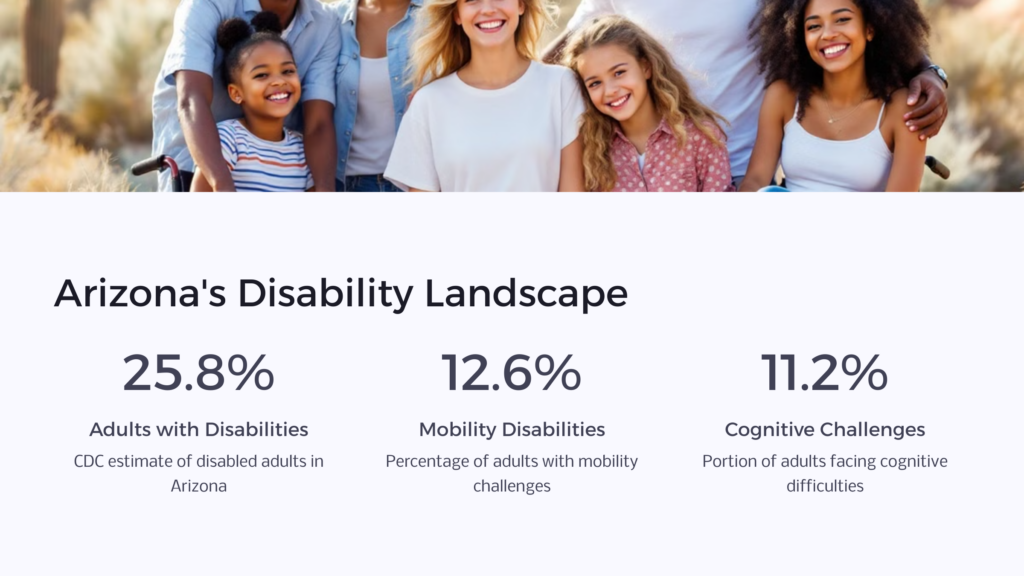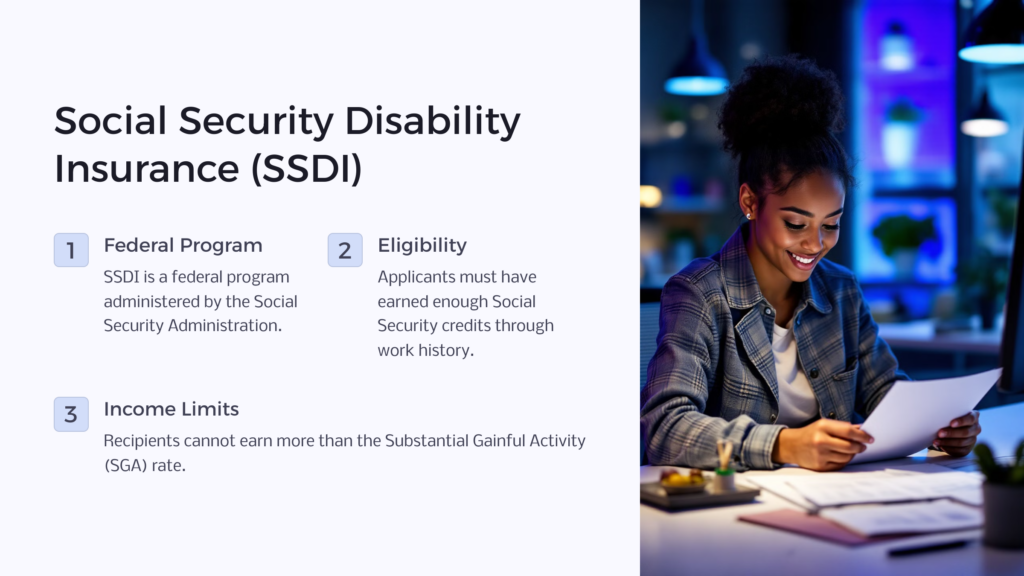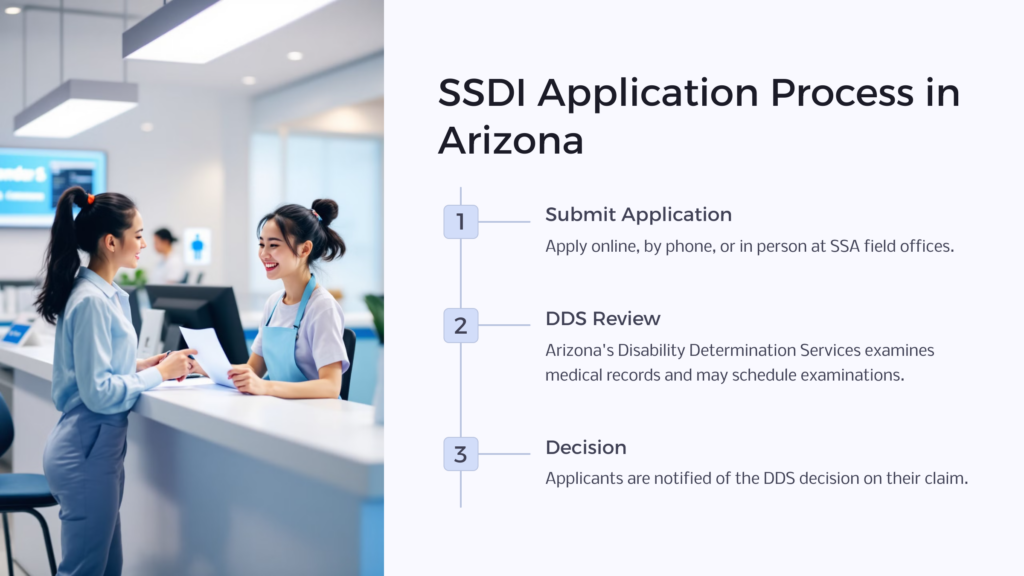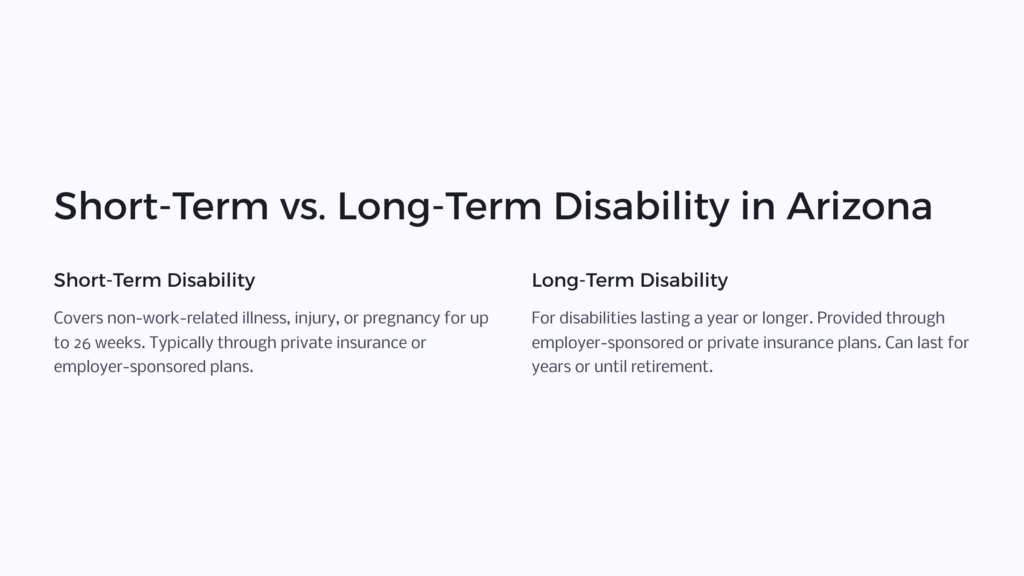In Arizona, disabled adults who meet specific requirements may receive disability benefits from the Social Security Administration.
Social Security Disability Insurance is a federal government program designed to help disabled adult citizens. Eligible recipients must have earned enough Social Security credits and cannot earn more than the SGA (Substantial Gainful Activity) rate for that year. In 2021, the SGA was $1,310 and $2,190 for people who have lost their eyesight.
Since SSDI is a federal program, Arizona is no different from other states regarding benefits. However, Arizona does provide some additional disability services as well.
Facts About Arizona

The CDC estimates that 25.8% of the adults in the Grand Canyon State are disabled. In addition, approximately 12.6% of the adult population in the state has mobility disabilities, 11.2% have cognition challenges, 6.8% can’t live independently, 5.9% have suffered hearing loss, and 4.7% have vision impairment challenges.
Members of the Arizona disability population can benefit from SSDI, Arizona’s Workers’ Compensation program, Supplemental Security Income, and Medicaid.
Arizona’s Vocational Rehabilitation Services also help disabled residents secure employment.
How To Qualify for SSDI in Arizona

SSDI is a federal government program overseen by the SSA. As such, federal disability laws apply.
In Arizona, the SSA administers the program through the state’s Department of Determination Services. The Arizona Department of Economic Security runs the DDS. Though SSDI applicants submit their disability benefit applications to Social Security, the DDS examines applicants and approves disability claims.
To be approved by the DDS, certain conditions must be met. For example, the state gives long-term disability benefits to disabled adults who have paid into the Social Security trust fund while working for at least five years during the ten years preceding the application.
Disabled veterans can also receive SSDI in Arizona, even if they already receive benefits from Veterans Affairs. Anyone with a developmental disability or long-term disability can apply for SSDI in Arizona. However, SSDI does not cover any short-term disability, defined as a disability or illness that is expected to last less than 12 months and is not life-threatening.
How To Apply for SSDI in Arizona

SSDI applicants must send their disability claim applications to the Social Security Administration. To apply for Social Security Disability Insurance benefits in Arizona, you can apply online at SSA.gov, by phone, or in person. There are 18 Social Security field offices in Arizona.
In addition to other personal information, the SSA requires the applicant’s name, Social Security number, and proof of age, citizenship, and work history.
Once you submit your information, your application is transferred to Arizona’s Disability Determination Services (DDS). The department examines your medical records and may schedule you for a physical examination. You will be notified once the DDS makes a decision.
How To Appeal a Denial in Arizona
The approval rate for the initial stage of SSDI applications in Arizona is approximately 34%. These figures are just below the national approval rate. Not to worry – if you are denied benefits, you can appeal a rejected disability claim up to four times.
The first stage of the appeals process is known as reconsideration. Within 60 days of receiving your rejection notice, you can ask for a reconsideration of your claim. The DDS will assign a new claims examiner to check your records. If you still get a rejection, you can request a disability hearing before an administrative law judge (ALJ).
If the judge also denies your appeal, you must proceed to the Appeals Council within 60 days. Finally, if none of these options work, you can appeal the rejection to a federal court.
A disability attorney can help make the appeals process go smoothly. An experienced disability lawyer will give you the right legal advice that can help you win your claim.
In Arizona, there are three Disability Adjudication and Review offices – two in Phoenix and one in Tucson. These offices can help if you have questions about the appeals process.
More Arizona Benefits
In addition to SSDI benefits, Arizona residents can apply for various state benefits that provide valuable assistance.
Apply for SSI in Arizona
Arizona residents with low incomes may qualify for SSI. In addition, Supplemental Security Income is available for low-income earners who are blind, disabled, or at least 65 years old.
The SSA will check for SSI eligibility when you apply for SSDI. Unlike some other states, Arizona doesn’t contribute to the SSI compensation. Instead, the program relies on federal funds, and recipients can receive up to $749 per month.
Arizona Medicaid
Low-income earners can access quality healthcare through Arizona Health Care Cost Containment System (AHCCCS).
AHCCCS is the Arizona Medicaid program that subsidizes the healthcare needs of eligible low-income earners. Parents or caretakers of children below 19 and pregnant women may qualify for the program even if enrolled in Medicare. Qualified recipients receive many benefits, including COVID-19 vaccines and assistive technology.
In 2021, families of four with an income at or below $36,570 and individuals who earn $17,774 or less may qualify for Medicaid in Arizona. Arizona’s KidsCare program also provides health care services to children whose families earn $54,325 or less (family of four).
Arizona Unemployment
Residents who lose their jobs through no fault may be eligible for Arizona unemployment benefits. Eligible individuals can receive up to $240 per week until they secure new employment. If the recipient does not find employment, the benefits will expire after 26 weeks.
How Does Short-Term Disability in Arizona Work?

In Arizona, short- and long-term disability benefits are distinct programs with different eligibility criteria and durations. Here’s how they differ:
1. Eligibility: Short-term disability benefits are typically available to individuals who are unable to work due to a non-work-related illness, injury, or pregnancy. The eligibility requirements usually involve paying into the state’s short-term disability insurance program or having coverage through a private insurance policy. Long-term disability benefits, on the other hand, are designed for individuals with a disability that is expected to last for an extended period, often a year or longer. These benefits are typically provided through employer-sponsored or private insurance plans.
2. Duration: Short-term disability benefits in Arizona generally cover a limited period, usually up to 26 weeks (six months). The exact duration and benefit amount can vary depending on the circumstances and the specific insurance policy or program. Long-term disability benefits, as the name suggests, provide coverage for a more extended period. The duration can range from several years or until the individual reaches retirement age, depending on the terms of the policy.
3. Application Process: When applying for short-term disability benefits, you typically need to follow these steps:
a. Notify your employer: Inform your employer about your condition and the need for short-term disability benefits as soon as possible. They will provide you with the necessary forms and guidance.
b. Obtain medical documentation: Gather relevant medical records and documentation from your healthcare provider(s) to support your disability claim. This may include medical reports, diagnoses, treatment plans, and any other pertinent information.
c. Complete the application: Fill out the required forms accurately and thoroughly, providing all the requested information. Make sure to include supporting medical documentation.
d. Submit the application: Submit your completed application and supporting documents to the appropriate entity, which may be the state’s disability insurance program or your private insurance provider.
 Benefits.com Advisors
Benefits.com Advisors
With expertise spanning local, state, and federal benefit programs, our team is dedicated to guiding individuals towards the perfect program tailored to their unique circumstances.
Rise to the top with Peak Benefits!
Join our Peak Benefits Newsletter for the latest news, resources, and offers on all things government benefits.




















